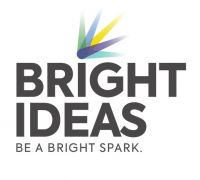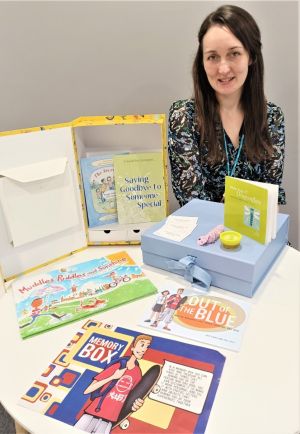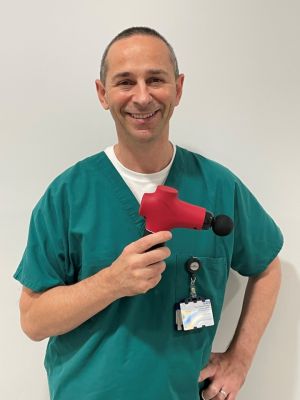Clatterbridge patients benefit from innovative Bright Ideas
Posted 15th August 2022

Patients at The Clatterbridge Cancer Centre are benefiting from an innovative initiative that encourages our workforce to share new ideas.
Staff have sent in almost 100 new ideas to improve patient experience at our centres, including memory boxes for bereaved children, non-standard equipment to lessen pain and discomfort, reusable water bottles and road testing virtual reality headsets to distract patients while they have treatment.
The Bright Ideas Scheme is being supported by The Clatterbridge Cancer Charity, which has provided a £150,000 fund to help implement the projects.
As a specialist provider with a strategic priority to ‘Be Innovative’, Clatterbridge is keen to be a testbed for new concepts and we strive to be enterprising to improve the experience of our workforce and patients. The Scheme also appeals for ideas about how we can be greener or a better neighbour, by making us more eco-friendly and improving how we support local communities.


One of the Bright Ideas which has already been implemented is for families dealing with bereavement. Memory boxes have been commissioned for children going through the incredibly difficult process of losing a loved one to cancer.
It was the idea of Michelle Williams, a Family Support Practitioner at Clatterbridge (pictured right), who encourages end-of-life patients to fill the boxes with personalised contents to create at ‘box full of love’. Children area also give books which help them understand the loss of a loved one.
Michelle said: “I applied to the Bright Ideas Scheme for support to fund children’s memory boxes and a library of books for children of all ages and abilities to understand cancer, treatment and dying.
“Our children’s memory boxes are personalised and bespoke. I have used one with a patient who wanted to leave a ‘box full of love’ for her seven-year-old granddaughter. It gives the patient some reassurance and control over what she wants her granddaughter to remember about their relationship.
“We also have boxes for children to use in bereavement to fill with lovely objects that remind them of the person who has died. We call these ‘touchstones to memory’ – items that bring back happy warm feelings. A smell, a photo, an item of clothing. Anything important to that child. These can really help children to continue that bond with the person who has died.
“Also in the box we provide coping mechanisms such as worry worms for younger children – which my mum actually crochets for me! Or a little tub of playdough to squeeze as stress or anger relief, and comfort cards with kind words that can bring reassurance during grief.”
Michelle, who is a qualified social worker and primary school teacher, added: “These resources encourage children to know it is okay to have negative emotions and to help release and manage these feelings.”
Another Bright Idea resulted in a tea set being bought to be used by relatives of patients who are facing having end of life care.
The Bright Ideas scheme has also resulted in the purchase of massage guns and TENS machines for pain relief, as well as handheld fans to help patients experiencing breathlessness and resusable water bottles for radiotherapy patients.
Dr Seamus Coyle, Consultant and Clatterbridge’s Clinical Research Lead in Palliative Medicine, asked the scheme to buy massage ‘guns’, sometimes called percussion massagers, which vibrate and are placed on painful muscles to relax them and ease discomfort (pictured right, with a massage gun).
These massagers are typically used by people recovering from sports injuries but Dr Coyle has been using the machines in a clinical setting for several months on patients whose pain is muscle-related and so is hard to lessen with medication.
Dr Coyle said: “Massage guns are widely available. Athletes often use them to help their muscles recover from training. They ‘vibrate’ muscles and help to relax them. They are used for relaxation and also as therapy for sore muscles. There are different levels of vibration, so it can go from mild to very strong. Their effect on pain is often instant.”
Dr Coyle has recommended massagers to a number of suitable patients he treats for pain. He says patients have fed back with supportive comments, including: “…for the first time in 10 months there was no pain at all. The relief brought me to tears. I now use the gun on a regular basis when I have a pain flair”.
The Scheme agreed to fund 20 of the massagers, which cost about £50 each.
Dr Gillian Heap, Director of Research & Innovation Operations, who chairs the Bright Ideas Scheme Panel, said:
“The Scheme was launched with the acknowledgement that our dedicated and passionate workforce often have great ideas about how to make improvements in their area of work but in the past have sometimes lacked the support or resources to get these ideas off the ground.
“We have been overwhelmed with the positive reaction from staff since the scheme launch last September. We have so far received almost 100 fantastic ideas, which we have been evaluating.
“It just shows how much innovation there is within our workforce”
